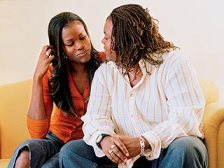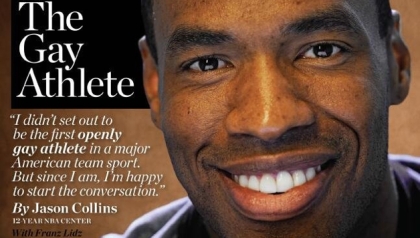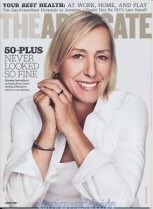 Like marking off items on a proverbial checklist, closeted LGBTQ individuals who exist within and outside of the world of professional sports, can recount the numerous things they struggle with in terms of their sexuality. From fearing of the actual coming out process, dressing in their car or at home to avoid the subtle glances and whispers of individuals in the locker room, to wondering what coming out would mean not only for their game but also for their social and, if they choose, spiritual lives, closeted and out LGBTQ individuals within the multi-billion dollar professional sports industry must grapple with that age old question: what does it mean to be gay and open about it?
Like marking off items on a proverbial checklist, closeted LGBTQ individuals who exist within and outside of the world of professional sports, can recount the numerous things they struggle with in terms of their sexuality. From fearing of the actual coming out process, dressing in their car or at home to avoid the subtle glances and whispers of individuals in the locker room, to wondering what coming out would mean not only for their game but also for their social and, if they choose, spiritual lives, closeted and out LGBTQ individuals within the multi-billion dollar professional sports industry must grapple with that age old question: what does it mean to be gay and open about it?
I have to be honest, Jason Collins’ admission that he is a homosexual, albeit brave, upset me. While I understand that coming out is an completely unique experience to every individual who does it, for me Jason Collins’ story was also an example of the rampant sexist and heteropatriarachal world that privileges male bodies and sexualities over those of women. While I applaud Jason’s story and the timing, the first thing I asked to my colleagues was: where was the same hubbub over Sheryl Swoopes or Martina Navratilova?
 As scholars, we have to be critical of the ways in which sexuality and identity politics are both utilized and taken advantage of in the public and private sector. As activists, specifically feminist and/or LGBTQ activists, we have to be diligent in maintaining a strict scrutiny of continual subjugation and objectification of women, regardless of the context.
As scholars, we have to be critical of the ways in which sexuality and identity politics are both utilized and taken advantage of in the public and private sector. As activists, specifically feminist and/or LGBTQ activists, we have to be diligent in maintaining a strict scrutiny of continual subjugation and objectification of women, regardless of the context.
Privilege plays a major factor in discussing sexuality and sports as well as in determining the ideology that separates the gender spectrum. Men can, as Collins has shown us, “toy with the idea [of coming out],” while women who are often considered to be masculine based on their performance and/or embodiment and suspected of being lesbian simply for playing sports as well as men.
Jason Collins will now, and forever more–and not only as a result of tokenization and identity colonization–be known as The Gay Athlete (go ahead, google the term, let me know what images come up first). One again, the voices of the women (and men) who have clearly come before him are silenced and pushed to the back of the proverbial historical line.
 While Collins’ coming out is intricately tied to feminism, his spirituality and sexuality appear to be at war with each other, specifically in his understanding of the black community and more importantly the black church.
While Collins’ coming out is intricately tied to feminism, his spirituality and sexuality appear to be at war with each other, specifically in his understanding of the black community and more importantly the black church.
Growing up in a religious family active in church, Collins understood that there was another dimension to his coming out: “the stigma that being gay [in the black community] is even worse than it is in the general population.”
Not wanting to be labeled the old grumpy codger that I will most likely become down the line, I want to end this exploration of sexuality and sports by commending Jason Collins’ coming out and the conversation it is sparking not only within the professional sports world but also in both the black community and the black church.
Jason Collins wasn’t the first and he certainly won’t be the last, but he is a catalyst for change that is getting global attention. He is an open Christian, a proud gay Black man, and a role model for younger generations of LGBTQ individuals who will most certainly look up to him for years to come.
However, what he is not is the face of homosexuality within the world of professional sports. That role belongs to all members of LGBTQ community, male, female, and trans who have feared coming out and forced themselves to live a life filled with anxiety because they think they do not have a choice in the matter.
Thanks for coming (out) Jason Collins, now take a seat at the axiomatic table full of your brothers and sisters who have come before you and the ones who will most certainly come after.
John Erickson is a doctoral student in American Religious History at Claremont Graduate University. His research interests involve an interdisciplinary approach and are influenced by his time as the director of a women’s center and active member in the GLBTQ and women’s rights movements. His work is inspired by the intersectionality of feminism, queer identity, and religious political and cultural rhetoric. He is the author of the blog, From Wisconsin, with Love and can be followed on Twitter at@jerickson85.




Thanks for keeping the conversation complex! I wonder which well-known male athletes will take the next step and openly question the ways in which male sport defines masculinity and male privilege in relation to women as sexualized objects.
LikeLike
Male sports, must admit I see it as the problem in and of itself, and that hetero men are the danger to gay men and to lesbians and to all women. Sports codifies male supremacy, so when women play sports we break all the rules from the very beginning. Boys used to spit on us for playing basketball after school on the court, that they believed was theirs, for example. Women are the heroines of tennis, and coming out. Of course male sports anything takes up all the oxygen in the room, and on TV and endlessly. We are inundated by male sports blather, and the anti-woman climate that is football itself.
Male sports and objectification of women go hand and hand. Just ask the cheerleaders for the male sports teams. If ever there was an object lesson that says it all. Some man comes out, but just how womanhating are the sports to begin with, and the hatred of women is the subtext for the homoeroticism of the male sports industrial complex to begin with.
And no the black community is NOT more homophobic than whites, it’s just that blacks are already oppressed, so the hurt can FEEL worse. This is white racism at its most liberal ane subtle. It’s like saying that republican men are worse the democratic men, well no, both groups of males rape, buy prostitutes and demean women. Both groups kill and rape women in war, so in terms of men, there is but one standard and it is patriarchy, in terms of race, there is one standard and that is homophobia. The black church, the white churches, saying the black church is worse than is just a racist comment period end of.
LikeLike
There are so many discussions here that we can have. I didn’t know where to start. Hopefully, this conversation continues, and by the way things have been going so far, I think this conversation will be around for a while now!
LikeLike
It was Jason Collins (not John Erickson) who said this: “the stigma that being gay [in the black community] is even worse than it is in the general population.”
He may or may not be right about which “part” of the US population puts more “stigma” on being gay. In any case, he is to be applauded for speaking the truth about his experience and for becoming a role model in his community.
LikeLike
John, Thanks for this post. It’s so important to keep the conversation nuanced, and that’s what you did by separating and then rethreading all the different forms of oppression involved in this incident.
I don’t follow sports much, but I remember that when Martina Navratilova came out, it was a BIG DEAL! Of course, I was a feminist then, so it was important to me as a gay/lesbian ally. I’m sure it doesn’t compare to Mr. Football, whatever his name is. As Turtle Woman says, football takes all the oxygen in the room and all the space on TV.
From my reading, coming out in the black church is much harder than in the white church (of course, depending on the type). Audre Lorde wrote about that way back when as did other black lesbian feminists.
LikeLike
wow. i love this column, john. very nuanced…thanks for posting. great food for thought.
LikeLike
Why people think it was not a big deal with Martina Navratilova is because it was so long ago. In the USA tennis is considered a minor sport but even in the US it once was a big sport. Remember the rivalry between Martina and Chris Evert the way Martina was treated very unfair only because she is a lesbian.
In the rest of the world tennis was and is big if you win 6 Wimbledons in a row like Martina did it is like winning 6 superbowls but then globally. Martina is still a superstar all over the world .
From New Zealand to the US, South America the whole of Europe including Eastern Europe boys and girls did find courage and strenght to come out. I can say that compared to Martina Navratilova Jason Collins is a journyman, he was not even known in the US let alone in the world. Collins is a big man but Martina is the real giant.
LikeLike